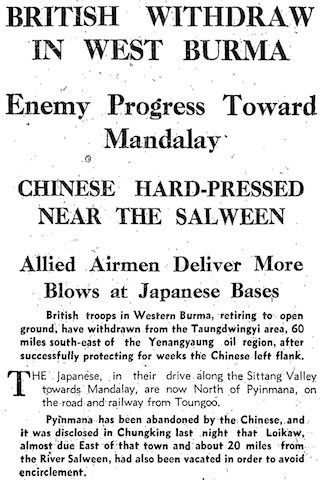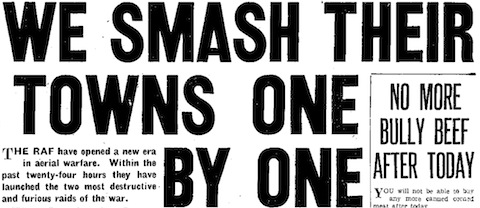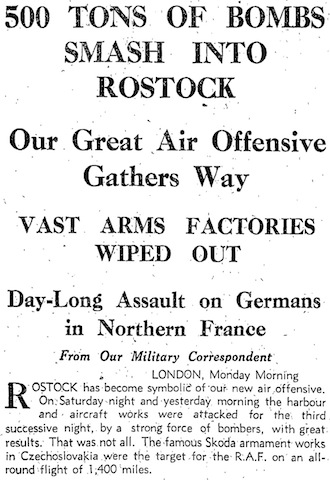
Yesterday's muted announcement of a British retreat in Burma is followed today by more prominent headlines of a further withdrawal, albeit this time in the Taungdwingyi sector. But while the front page of the Yorkshire Post (above) grimly declares that
OUR retirement through Central Burma is bringing us nearer the plains of Mandalay and the defence of Northern Burma
it immediately goes on to find hope in yesterday's revelation that US Army troops were already in India. It is suggested that this may in time develop into one of America's major fronts against Japan. In the meantime, though, hard fighting will be necessary to protect the Burma Road which is threatened by 'a Japanese force of tanks, guns and infantry', though on the Post's analysis this is to stop Chinese reinforcements reaching Burma rather than Allied supplies reaching China. Further withdrawals are likely British troops will likely have to fall back on Meiktila.
Present policy is to deny the enemy the high ground in the North and keep him on the lower flats until the rain breaks and floods the river valleys.
The Times notes that Japan has been aided by 'traitorous Burmese' (5) and has the advantage of being able to use two good roads from the east, whereas communications between India and Burma are poor. Still,
In difficult circumstances our troops have never weakened, whatever the strain. Whenever the call has come, fatigue has been forgotten. Gurkhas, Baluchis, Frontier Force Rifles have vied with British units in courage and resolution. No finer fighting has been seen in this war. Coolness allied with determination has extricated the force or portions of it from many ugly situations, though not always without regrettable loss in men and material.
It's probably easier to forget the fatigue of the troops in Burma from the vantage point of London than it would be on the spot!
The Manchester Guardian relays a report from the Swedish press that Germany is fortifying 'from Norway to the coast of Spain' against 'a British invasion', 'a formidable chain of reinforced concrete barricades, heavy batteries, and aerodromes' (8). A Norwegian correspondent reports that the headquarters for the occupying forces there are moving north from Oslo, presumably to be closer to any landing.
Rumours of an imminent British invasion are circulating through Norway, and some 'optimists' are expressing the conviction that the British 'will come on May 1.' German defence moves have strengthened the rumours and the Quisling regime is faced with growing hostility. Panzer vehicles were seen in Oslo for the first time on Monday during a Nazi review of armoured cars and tanks.
Indeed, Lord Beaverbrook (until recently Minister of Supply, now out of government), in a New York speech last night which was broadcast across the United States, advocated Britain 'setting up somewhere along the 2,000 miles of coastline now held by the Germans a second front in Western Europe' (Daily Express, 2). He professed himself inspired here by Stalin's aggressiveness in launching a counteroffensive even while German forces were at the gates of Moscow, but he also believes that the war in Russia is in the balance:
[...] Russia may settle the war for us in 1942. By holding the Germans in check, possibly even by defeating them, the Russians may be the means of bringing down the whole Axis structure down.
That is a chance, an opportunity to bring the war to an end here and now. But if the Russians are defeated and driven out of the war, never will such a chance come to us again.
There was also talk about invasion in the House of Commons yesterday, though it was about an invasion of Britain, not by Britain. A. P. Herbert, the independent member for Oxford University, complained that 'some confusion and ignorance prevailed concerning the duties of citizens' in event of invasion (Manchester Guardian, 6). According to Sir Percy Hurd, Conservative member for Devsizes, some local defence committees were issuing instructions 'to households to dig 'slit' trenches in their gardens, an instruction which, he said, householders were refusing to take seriously'. Herbert Morrison, the Home Secretary, seems to have done little to assuage the concerns of MPs, apart from telling them that 'the Government was determined to carry out the "stand-fast" policy'. When told, by Conservative MP Sir Stanley Reed, 'that local authorities were "seriously perturbed" at the possibility of an exodus from London and other large towns', all Morrison could say was that 'his department was in touch with all the authorities concerned'. Perhaps he was taken by surprise by these questions, as with German forces tied up in Russia an invasion of Britain hardly seems likely. Then again, as Beaverbrook said, the Soviets could still collapse and the bulk of German forces would then be free to turn west (again).
The Yorkshire Post's air correspondent claims that Bomber Command has tacitly adopted a new policy (2):
There is greater concentration of effort. Fewer scattered targets are chosen, and the ones that are selected are given a considerable weight of bombs at every visit.
That is all to the good. Bombing has a cumulative effect. A single, short, sharp raid does not do much more than give the populace some excitement. A series of raids of equal or mounting intensity beats down the excitement and, in the end, produces fatigue, worry and nervousness.
Bomber Command seems to now be following 'the lines that some of the critics suggested long ago'. These critics are not named, but they wondered why oil targets were top priority one moment and dropped the next, for example. They also drew upon the experience of the Blitz:
When there was bombing in this country it was often urged that only sustained and concentrated bombing could hope to bring about massive results, and that the R.A.F. ought to concentrate more and readjust its list of priorities so that fewer targets were selected but those few thoroughly hammered.
There is evidence to suggest that this new policy is working already:
Such raids are also liable to cause large population movements, and these are seriously hampering to the war effort of any nation. There is some evidence that considerable population movements followed the R.A.F. night raid on Luebeck. These must to some extent have embarrassed German communications, and must have dislocated their transport of war materials.
A stop-press on the back page of the Post (6) reports that
Incendiary and H.E. bombs were dropped in a South-West district of England early to-day. Three fires which were started were quickly brought under control. Damage was caused to a row of cottages in a rural area.
![]() This work is licensed under a Creative Commons Attribution-NonCommercial-NoDerivatives 4.0 International License.
Permissions beyond the scope of this license may be available at http://airminded.org/copyright/.
This work is licensed under a Creative Commons Attribution-NonCommercial-NoDerivatives 4.0 International License.
Permissions beyond the scope of this license may be available at http://airminded.org/copyright/.





Pingback:
Airminded · Saturday, 25 April 1942
Erik Lund
On another perhaps-unrelated note, what's your impression of the press reception of the "Second Front Now!" campaign, Brett? It's hard to believe that we're only three months out from the nonconfidence vote.
Brett Holman
Post authorI've been surprised at how much there is (and there are references I haven't mentioned for lack of time). Not so much a keenness for an actual 1942 D-Day but (and I guess this is less surprising) the impression that what Britain is already doing amounts to a second front (bombing especially but also commando raids and just the possibility of a landing in force) and is diverting scarce German resources from the Russian front. In that respect it's entirely consistent with what Churchill was trying to tell Stalin. But there does seem to an element of guilt as well as self-interest: we really should be doing more to help the Russians...
Pingback:
Airminded · Tuesday, 5 May 1942
Pingback:
Airminded · Post-blogging the Baedeker Blitz: conclusion